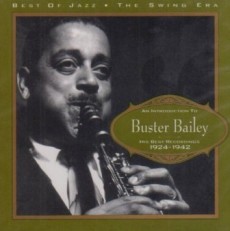
Daily Dose Of Jazz…
William C. “Buster” Bailey was born July 19, 1902 in Memphis, Tennessee and was educated on the instrument by classical teacher Franz Schoepp, the man who taught Benny Goodman. He got his start with the W.C. Handy Orchestra in 1917 when he was just fifteen years old. After two years of touring with Handy, he quit while the band was in Chicago and in 1919 Bailey joined Erskine Tate’s Vendome Orchestra.
1923 saw Buster joining up with Joe “King” Oliver as part of his King Oliver’s Creole Jazz Band. It was here that he met and became friends with fellow band mate Louis Armstrong. In 1924, when Armstrong left King Oliver’s Jazz Band to join the Fletcher Henderson Orchestra in New York. It was less than a month that Armstrong extended an invitation for Bailey to join the band and accepting, he moved to New York City.
During the late 1920s Bailey became a highly respected sideman with Perry Bradford, Clarence Williams and others, Recording both clarinet and soprano saxophone. He toured Europe with Noble Sissle’s orchestra in 1927, returned and performed with Edgar Hayes and Dave Nelson, rejoined Sissle in 1931. By 1934 he was back with Henderson and then settled in with the John Kirby Band. Off and on he would perform with the mills Blue Rhythm Band, Midge Williams and Her Jazz Jesters and record as a leader as Buster Bailey and His Rhythm Busters.
In 1947 he joined Wilbur de Paris and performed with him until 1949. During the early 1950s Bailey was with Big Chief Russell Moore but for most of the decade he played with Henry “Red” Allen. From 1961 to 1963 he performed with Wild Bill Davison, the Saints And Sinners, and rejoined his old friend Armstrong and became a member of Louis Armstrong and His All-Stars.
Buster appeared on film three times during his career in That’s The Spirit in 1933, Sepia Cinderella in 1947 as part of John Kirby’s band and in When The Boys Meet The Girls in 1965 with Louis Armstrong. He also appeared in 1958 in the DuMont TV series Jazz Party and in 1961 on the TV program The Dupont Show of the Week in an episode titled “America’s Music – Chicago and All That Jazz”.
Clarinetist Buster Bailey, who was also well versed on saxophone and one of the most respected session players of his era, passed away in Brooklyn, New York on April 12, 1967 of a heart attack.


